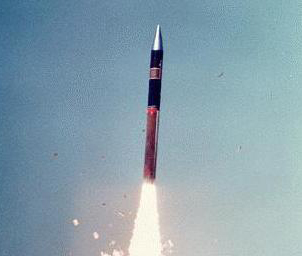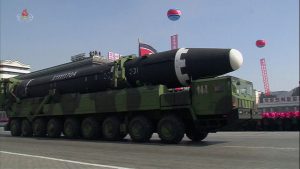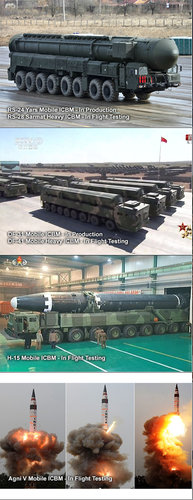NK ad Iran are continuing to develop them because BP was never fielded and nearly all SDI spending was pretty much axed after 1991.
NK has a "theoretical" ability to hit the US with an ICBM, Iran has no chance. You are assuming SDI and BP would have 'detered' them from trying to build ICBM's but keep in mind they have NOT actually done so since their "ICBMs" are more space launchers and not real weapons.
Right now they could deliver them by ICBM. They could try smuggle one in by ship but that is a long journey that intelligence services would have a good chance of picking up on.
IRBMs actually and those were developed to hit the 'neighbours'. And no they are unlikely to try and smuggle a 'missile' onto a ship, again it's not an actual viable method because they LOSE if they try it and the US is NOT the targets they want to 'take down' if they are going down.
NK didn't develop ICBMs to target its neighbours.
IRBMs it did and it's "ICBM" is a very complex and slow to launch multi-stage missile that would have to first be UNOTICED while preping to launch which can take up to a week and THEN pass through multiple layers of defense systems to reach the US. And as a above that's NOT the target nor would they consider 'wasting' a weapon on such a target if they were going down. (I'll grant they MIGHT do so to try and draw an un-restrained US response just to heap more damage to the area but it's not likely as they can try and hit closer and more vulnerable targets without going up against such defense systems)
On the last note, if you prevent proliferation with a stronger missile defence then the chances of nukes finding their way into terrorist hands reduces. Russia and China may move to counter and the US may counter that but the threat of Russia and China having more nukes bothers me less the thought of NK having any at all.
"Proliferation" by nation states leading to nuclear weapons in 'terrorist' hands is a myth. The simple fact is that any nation that CAN build nuclear weapons is well aware that "terrorists" are just as likely to target those that 'gave' them the weapons as someone else. Further it is quite easy to tell from the detonation not only WHO made the weapon but where the materials are from, (down to specific mines where the uranium came from no less) so peopel who HAVE nuclear weapons are very, very careful with who has access to them. And I don't understand how you can assume that missile defense is what prevents proliferation. Proliferation was prevented by both international agreement and enforcement which degraded once the Cold War was over. The knowledge and ability to make nuclear weapons has always been difficult to contain and the best that can be done is to try and limit the proliferation. But for the majority of possible delivery systems available to those nation now seeking such weapons the ICBM is the very LAST one on the list. So BP and SDI would be seen by nations such as Russia and China as being aimed at them not some rogue nation state or terrorits organization and they'd be right.
You likely SHOULD be bothered about NK having nukes, Iran too, because they would be VERY unlikely to use them against the US itself but raining destruction on their neighbors should, oh say, the US come knocking one day and rendering large swaths of the Korean Penisula or the Middle East, (and if "you" are going to go why NOT blow up a dozen gun-type bombs as surface bursts in your own nation to put as much radioactive debris into the environment as possible, truck or fly some to nearby oil fields as well the more the merrier) contaminated.
Even if we manage to cut off ANY means of delivering a nuclear weapon outside their country they'd still use them if they thought they had no choice which is really the reason they want them in the first place anyway. SDI and BP in fact NO anti-ICBM system is going to change that thinking, and in that thinking btw I think Iran is a lot less wonky than NK is.
Randy




